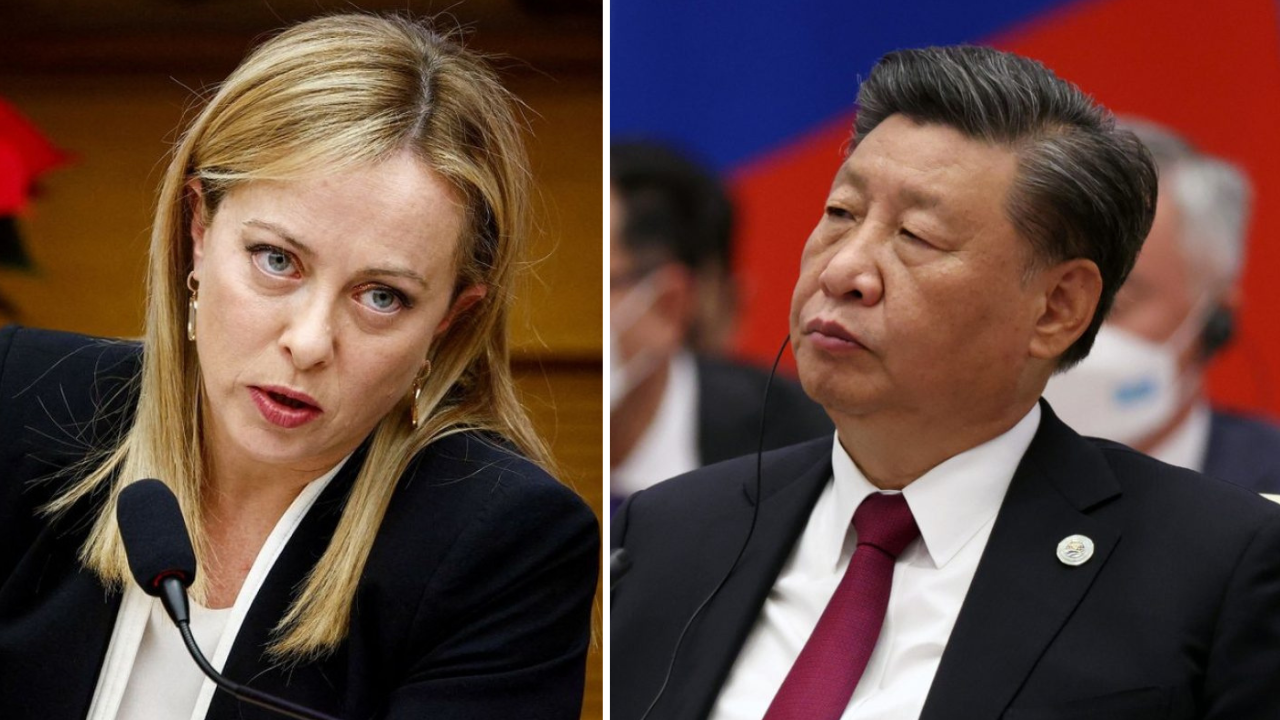‘Deal has failed to meet expectations’
Ahead of his three-day trip to Beijing, Italian foreign minister Antonio Tajani said the BRI deal with China “has failed to meet Italian expectations”.The BRI deal is due to be renewed automatically in March 2024 unless Italy withdraws by the end of this year.”We want to continue to work closely with China, but we must also analyse exports: the BRI has not produced the results we were hoping for,” Tajani told an economic forum before leaving for Beijing. He said Italian exports to China in 2022 were worth 16.5 billion euros ($17.8 billion), whereas the figures for France and Germany were much higher at 23 billion and 107 billion euros, respectively.
Italian defense minister Guido Crosetto recently called Italy’s decision to join the BRI an “improvised and atrocious act”, while Prime Minister Giorgia Meloni has often said that the deal was a “big mistake” that she intends to correct.
Major embarrassment for Xi
China’s ambitions in Europe will suffer a major setback if Italy withdraws from the deal and will be major embarrassment for Chinese President Xi Jinping.
The largest-ever global infrastructure undertaking is Xi’s flagship foreign policy programme — consisting of massive investments in infrastructure like ports, railways and airports — to improve trade ties between Asia, Africa and Europe.
In 2019, the highly indebted Italian economy shocked the US and Europe by becoming the only nation from the G7 club of industrialised countries to take part in China’s Belt and Road Initiative. The move enraged Washington and represented a major political victory for Xi.
By exiting the BRI, Rome will be dealing an embarrassing blow to Beijing on the initiative’s 10th anniversary. Given how closely intertwined the BRI is with Xi’s political legacy, Beijing has reacted sharply to the withdrawal rumours and criticised “some forces” for “hyping up and politicising” Rome’s membership in the BRI.
The planned withdrawal also underscores a broader shift in Europe as governments grow increasingly wary of their economic dependence on Beijing.
Withdrawal in the works
The withdrawal “has likely already been agreed in principle with Chinese authorities”, Lorenzo Codogno, a former chief economist at the Italian treasury, told AFP.
Meloni “will make the official announcement during her state visit to Beijing (expected by mid-October) as a sign of respect for China’s leadership”, but the Italian parliament will have the final say, he added.
Meloni’s predecessor Mario Draghi had frozen the agreement and blocked large-scale Chinese investment in sectors deemed of strategic importance.
Why Italy took the deal
According to a report by the Council on Foreign Relations (CFR), Italy had suffered through three recessions within a decade and the nation was looking to attract investment and expand Italian exports’ access into China’s huge market.
At the time, many Italians felt abandoned by Europe, while its populist government was skeptical of the European Union and more than willing to turn to China to fulfill its investment needs.
Italy saw an opportunity to leverage its political weight to sign on to the BRI in hopes of beating out others for Chinese attention and investments.
Under the auspices of the BRI, Italy signed numerous institutional arrangements with China, covering everything from double taxation to recognition of certain sanitary requirements for pork exports, cultural property and heritage sites, and minor commercial agreements.
Little impact on Italy’s economy
But these arrangements failed to fundamentally change the trajectory of Italy-China economic ties. Since Italy joined the BRI, its exports to China have increased from 14.5 billion euros to 18.5 billion euros, while Chinese exports to Italy have grown far more dramatically, from 33.5 billion euros to 50.9 billion euros.
Chinese investment in non-BRI countries in Europe has far outstripped its investments in Italy, with Chinese FDI in Italy dropping from $650 million in 2019 to just $33 million in 2021. Another database reports that China has invested $24 billion in Italy since 2005, but only $1.83 billion of that was made following Italy’s decision to join the BRI. Italy’s experience demonstrates that joining the BRI does not necessarily confer a country’s special status with China or guarantee it more trade and investment with China than would occur absent BRI, said the CFR report.
China’s crumbling relations
In the decade since BRI’s inception, two-thirds of European Union members, mostly in the east, have joined China’s Belt and Road Initiative. Many of these countries, like Italy, were grappling with slumping economies and touted the potential economic gains that could come from BRI investment.
The deal, however, has not brought great dividends for most of the nations, many of whom are also reconsidering the partnership.
China’s diplomatic push in Central and Eastern Europe, called the 17+1, has progressively lost members over the years; more recently in April, a key trade and investment agreement between the European Union and China collapsed.
Europe is increasingly seeing China as a competitor, as a rival, as a challenge, and less as an economic opportunity, which is how it used to see China.
President of the European Commission Ursula von der Leyen recently argued that “the Chinese Communist Party’s clear goal is a systemic change of the international order with China at its center,” pointing to the BRI as evidence.
Beijing’s support for Russia in its war against Ukraine has also led many European governments, including Italy’s, to shed their illusions about China.
(With inputs from agencies)
